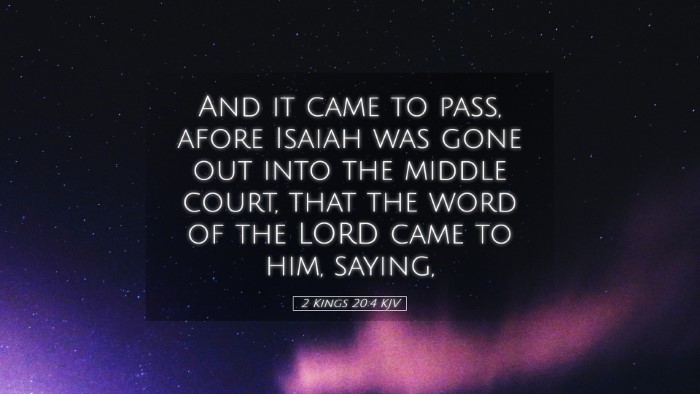Old Testament
Genesis Exodus Leviticus Numbers Deuteronomy Joshua Judges Ruth 1 Samuel 2 Samuel 1 Kings 2 Kings 1 Chronicles 2 Chronicles Ezra Nehemiah Esther Job Psalms Proverbs Ecclesiastes Song of Solomon Isaiah Jeremiah Lamentations Ezekiel Daniel Hosea Joel Amos Obadiah Jonah Micah Nahum Habakkuk Zephaniah Haggai Zechariah Malachi2 Kings 20:4
2 Kings 20:4 KJV
And it came to pass, afore Isaiah was gone out into the middle court, that the word of the LORD came to him, saying,
2 Kings 20:4 Bible Commentary
Commentary on 2 Kings 20:4
Verse: "And it came to pass, before Isaiah was gone out into the middle court, that the word of the Lord came to him, saying," (2 Kings 20:4, KJV)
Context and Background
The context of this verse is critical for understanding its significance. The narrative occurs during the reign of King Hezekiah, who faced a terminal illness and imminent death. This period is marked by a profound interaction between divine sovereignty and human supplication. Hezekiah's plea to God, which precedes the events of verse 4, illustrates a model of earnest prayer and reliance upon God's mercy.
Theological Insights
This passage highlights several theological themes, particularly the immediacy of God's response to His faithful servants. As noted by Matthew Henry, the rapidity with which God responds to Hezekiah's distress serves as a reminder of God's mercy and readiness to deliver those who earnestly call upon Him. The divine intervention, captured in this verse, emphasizes a God who is not distant but actively involved in the affairs of His people.
Commentary Insights from Notable Theologians
Matthew Henry
Matthew Henry remarks on the speed and nature of God’s message to Isaiah, noting that the prophet had not even exited the palace when God instructed him to return with a message of life. This swift action not only underscores God’s attentiveness to His people but also His desire to reaffirm the promises He has made. Henry emphasizes that God's promises are often communicated in unexpected ways, and it should encourage believers to continue to seek God’s guidance and warning.
Albert Barnes
Albert Barnes draws attention to the immediate shift in narrative from Hezekiah's lament to God’s directive to Isaiah. He notes that this highlights the role of the prophet as God's messenger, emphasizing the importance of prophetic authority in communicating God's will. Barnes further expands on the theological implications of God's promise of health and longevity—encouraging believers to trust in divine providence and the assurance that God can alter the course of life when it aligns with His purposes.
Adam Clarke
Adam Clarke provides a comprehensive discussion on the significance of prophetic timing and the immediacy of God’s revelation. He points out that the phenomenon of divine intervention often occurs unexpectedly and at pivotal moments in history. Clarke highlights the assurance that God can act rapidly on behalf of His faithful people. He urges readers to reflect on their own lives and remember that such divine interventions don’t always come in a manner we anticipate, but they are always timely and significant.
Application for Pastors and Theologians
This passage offers several pertinent applications for pastors, students, and theologians:
- Urgency in Prayer: The example of Hezekiah encourages a posture of urgency in prayer. His heartfelt plea underlines the belief that earnest prayer can invoke divine action.
- Trust in God's Timing: The speed with which God responds can remind believers that His timing is often beyond human comprehension. Patience and trust in God’s plans are paramount.
- The Role of Prophecy: The passage invites a deeper exploration into the role of prophecy and the prophetic voice in the life of the church today. It raises questions regarding how believers discern and follow God's messages in contemporary contexts.
- God's Sovereignty: The assurance of God's involvement in the details of life encourages followers of Christ to embrace His sovereignty, especially in times of distress.
Conclusion
In conclusion, 2 Kings 20:4 serves as a powerful reminder of God's unwavering commitment to His people and His willingness to intervene in their lives. The reflections from prominent commentators enrich our understanding of the text, urging us to embrace prayer, recognize God's providential care, and to be mindful of the call of the prophetic in our own lives. As we reflect on this passage, may we be inspired to seek God earnestly and to trust wholly in His promises.


